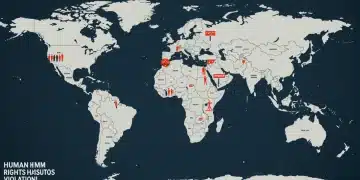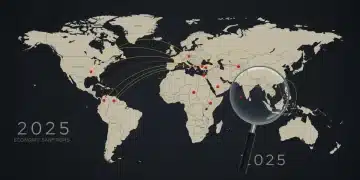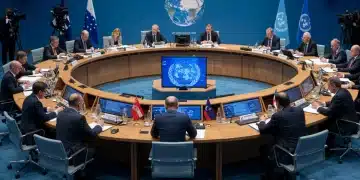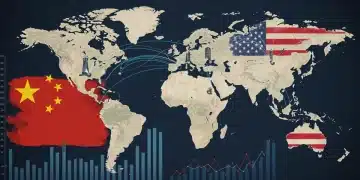Global Authoritarianism’s 10-Year Impact on Democracies: 2025 Analysis
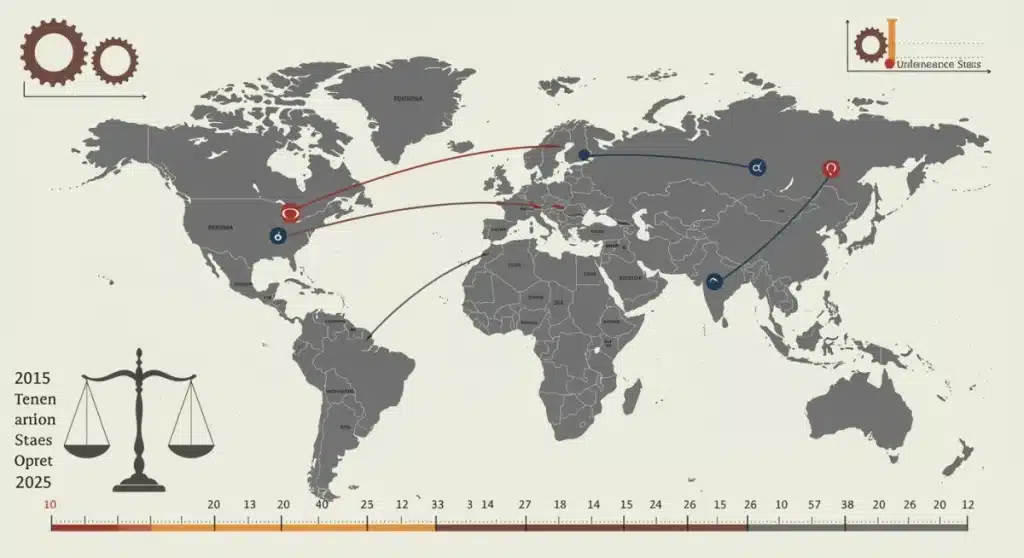
This 2025 analysis delves into the decade-long impact of global authoritarianism on democratic nations, providing crucial comparisons and recent updates for a comprehensive understanding of evolving geopolitical landscapes.
The Rise of Global Authoritarianism: A 2025 Analysis of its 10-Year Impact on Democratic Nations (COMPARISON/ANALYSIS, RECENT UPDATES) is shaping today’s agenda with new details emerging from officials and industry sources. This update prioritizes what changed, why it matters, and what to watch next, in a clear news format.
Understanding the Decade of Democratic Erosion
The past decade, from 2015 to 2025, has witnessed a significant and concerning trend: the erosion of democratic norms and institutions across the globe. This period signifies a critical juncture where the long-held assumptions about democracy’s inevitable spread have been challenged by the persistent and often aggressive expansion of authoritarian influence. Many nations once seen as stable democracies now contend with internal pressures and external manipulations that threaten their foundational principles.
This democratic backsliding is not uniform; it manifests in various forms, from subtle legal changes to overt suppression of dissent. The comparison between regions reveals distinct patterns, yet the underlying current of reduced freedoms and increased state control remains consistent. Recent updates confirm that this trend is accelerating in some areas, demanding immediate attention and a clear understanding of its multifaceted nature.
Geopolitical Shifts and Authoritarian Consolidation
Geopolitical landscapes have dramatically shifted over the last ten years, creating an environment ripe for authoritarian consolidation. Major powers, including China and Russia, have actively promoted alternative governance models, often leveraging economic aid, technological surveillance, and disinformation campaigns to undermine democratic processes abroad. This active promotion challenges the Western-led liberal international order, creating a more fragmented and competitive global arena.
The consolidation of authoritarian regimes often involves a sophisticated blend of internal repression and external projection of power. Internally, these regimes tighten control over media, civil society, and electoral processes. Externally, they seek to build alliances and influence international institutions, often by offering development models that prioritize stability and economic growth over individual liberties. This dual approach has proven remarkably effective in expanding the reach of global authoritarianism impact.
Key Tactics of Authoritarian Regimes
- Information Control: Extensive censorship and state-controlled media narratives to shape public opinion and suppress dissent.
- Technological Surveillance: Use of advanced digital tools for monitoring citizens, tracking opposition, and enforcing compliance.
- Economic Coercion: Leveraging financial and trade relationships to influence political decisions in other nations.
- Electoral Manipulation: Implementing legal frameworks or direct interference to ensure favorable election outcomes.
These tactics are not isolated; they often work in concert to create a robust system that stifles opposition and reinforces the ruling elite’s power. The long-term implications for democratic nations are profound, as they find themselves navigating a world increasingly shaped by these illiberal forces.
The Economic Weaponization of Global Authoritarianism
Over the past decade, authoritarian states have increasingly weaponized economic interdependence, transforming trade, investment, and financial flows into tools of political influence and coercion. This strategy represents a significant challenge to democratic nations that have historically relied on open markets and free trade as cornerstones of international cooperation. The economic weight of certain authoritarian powers allows them to exert pressure on smaller economies, compelling them to align with their geopolitical interests or face punitive measures.
For instance, countries relying heavily on trade with authoritarian giants often find their foreign policy choices constrained. Decisions regarding human rights, diplomatic relations, or international alliances can be met with economic retaliation, such as tariffs, boycotts, or restrictions on investment. This creates a dilemma for democratic governments, forcing them to balance economic prosperity against their core values and sovereign decision-making. Recent updates show a growing sophistication in these economic tactics, making them harder to counter effectively.
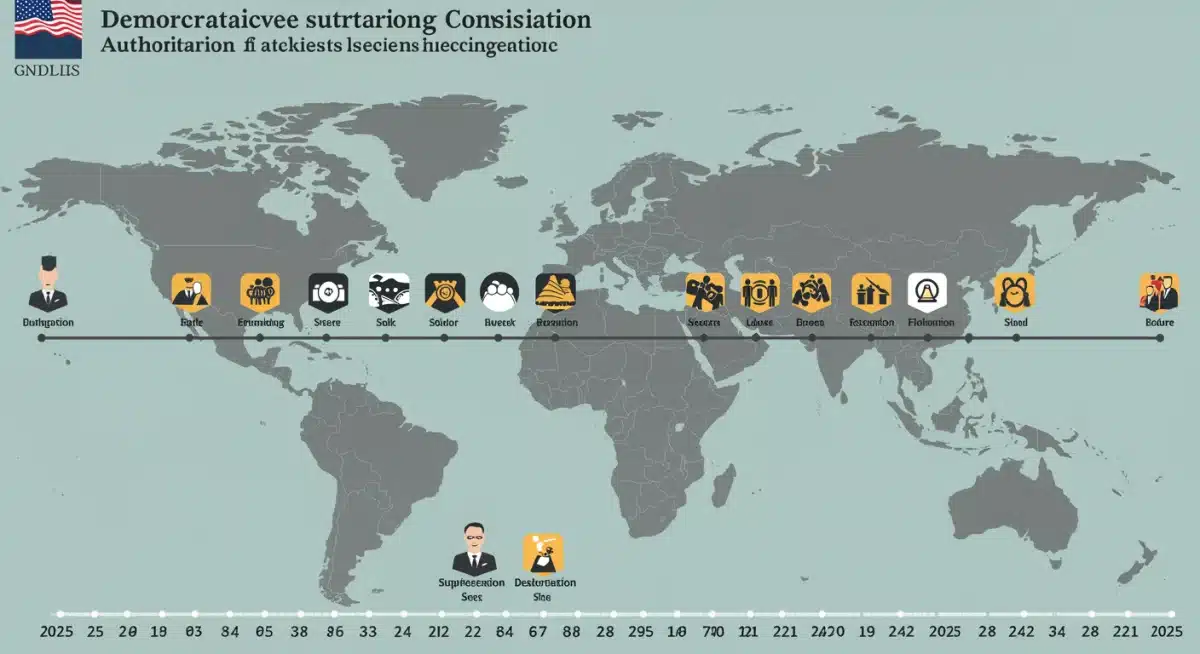
Economic Tools Employed
- Debt Diplomacy: Providing large loans to developing nations, often leading to dependency and leverage over their infrastructure or resources.
- Market Access Restrictions: Limiting foreign companies’ access to domestic markets based on their home country’s political stances.
- Strategic Resource Control: Dominating global supply chains for critical minerals or technologies to influence geopolitical outcomes.
- Sanctions and Boycotts: Imposing economic penalties on nations or entities that do not conform to specific political demands.
The weaponization of economics by authoritarian regimes underscores a fundamental shift in global power dynamics. Democratic nations are now forced to re-evaluate their economic vulnerabilities and strengthen their resilience against such coercive practices. This involves diversifying supply chains, fostering new trade partnerships, and developing collective strategies to counteract economic pressure, mitigating the global authoritarianism impact.
Technological Frontlines: Surveillance and Disinformation
The technological revolution, particularly in artificial intelligence, surveillance, and digital communication, has become a critical battleground in the struggle between authoritarianism and democracy. Authoritarian regimes have embraced these technologies with an unprecedented zeal, deploying them to enhance internal control and project influence externally. This has created a new set of challenges for democratic societies, which often struggle to balance security concerns with privacy rights and freedom of expression.
Internally, advanced surveillance systems, facial recognition technology, and social credit systems are used to monitor citizens, suppress dissent, and enforce ideological conformity. This pervasive control stifles civil liberties and creates a climate of fear, making it difficult for opposition movements to organize. Externally, state-sponsored disinformation campaigns, often amplified by social media, aim to sow discord, manipulate public opinion, and undermine trust in democratic institutions in target countries. These campaigns are sophisticated, adaptive, and increasingly difficult to detect and counter.
Cyber Tactics and Their Effects
- State-Sponsored Hacking: Cyberattacks targeting critical infrastructure, electoral systems, or political opponents in democratic nations.
- Deepfakes and AI-Generated Content: Creation of highly realistic but false media to spread propaganda and mislead the public.
- Social Media Manipulation: Use of bot networks and troll farms to amplify specific narratives and suppress dissenting voices online.
- Censorship and Internet Shutdowns: Restricting access to information and communication platforms during times of political sensitivity or unrest.
The digital domain has thus become a crucial arena where the global authoritarianism impact is felt most acutely. Democratic nations must invest in cybersecurity, media literacy, and international cooperation to defend against these digital threats and protect the integrity of their information ecosystems.
Eroding International Norms and Institutions
The past decade has also seen a deliberate effort by authoritarian states to reshape or undermine international norms and institutions that traditionally upheld democratic values and human rights. This strategy involves challenging established principles, reinterpreting international law, and weakening multilateral organizations from within. The goal is to create a global order that is more amenable to authoritarian practices and less critical of their internal affairs.
This erosion manifests in various ways: blocking resolutions at the United Nations, withdrawing from international treaties, or promoting alternative human rights frameworks that prioritize state sovereignty over individual liberties. By questioning the universality of human rights and democratic principles, authoritarian regimes seek to legitimize their own systems and diminish the moral authority of democratic nations. This makes it harder for democracies to collectively address global challenges and uphold shared values, as the consensus built over decades begins to fracture.
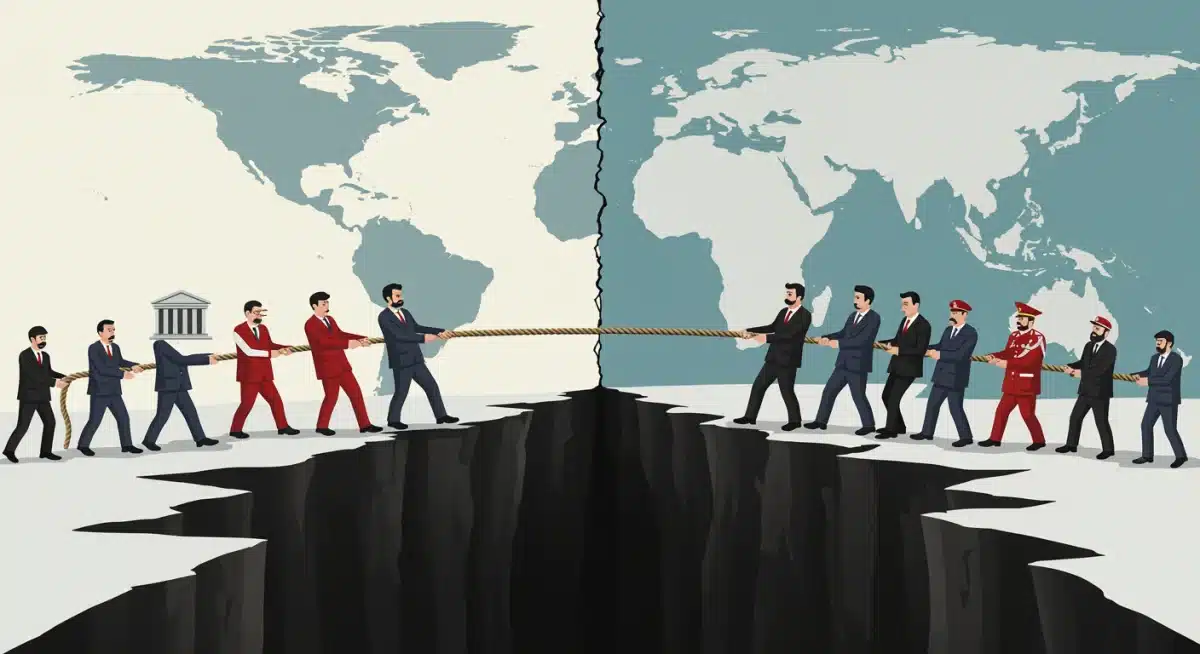
Challenges to Global Governance
- Veto Power Abuse: Using positions in international bodies to block actions that condemn authoritarian practices or support democratic transitions.
- Alternative Alliances: Forming new international groupings that exclude democratic nations or promote non-democratic governance models.
- Weakening Human Rights Mechanisms: Resisting international scrutiny of human rights records and questioning the legitimacy of international human rights bodies.
- Disregard for International Law: Openly flouting international agreements or norms when it serves national interests, without significant international repercussions.
The weakening of these international structures has a profound global authoritarianism impact, as it reduces the collective capacity of democratic nations to respond to crises and promote their values globally. Rebuilding trust and strengthening these institutions is a critical task for the coming years.
Democratic Resilience and Counter-Strategies
Despite the pervasive rise of global authoritarianism, democratic nations are not without agency. The past decade has also seen various efforts to bolster democratic resilience and develop counter-strategies. These initiatives range from strengthening domestic institutions to fostering international alliances aimed at defending democratic principles. The understanding that democracy is not self-sustaining but requires active nurturing and defense has become increasingly prevalent among policymakers and civil society organizations.
Efforts include investing in civic education, supporting independent media, combating disinformation, and promoting transparent governance. Internationally, democratic nations are exploring new forms of cooperation, such as technology alliances and economic partnerships that prioritize shared values over mere transactional relationships. The goal is to create a robust network of democracies capable of resisting authoritarian pressures and offering a compelling alternative model of governance. Recent updates highlight the urgency of these efforts, with many nations actively seeking innovative ways to protect their democratic spaces.
Strategies for Democratic Revival
- Strengthening Rule of Law: Reinforcing judicial independence and ensuring accountability for all, including political leaders.
- Supporting Civil Society: Providing resources and protection to NGOs, human rights defenders, and independent journalists.
- Promoting Digital Literacy: Educating citizens to critically evaluate information and identify disinformation campaigns.
- Economic Diversification: Reducing reliance on authoritarian states for critical goods and markets to lessen economic coercion.
The battle for democracy is far from over. While the global authoritarianism impact has been significant, the capacity for democratic societies to adapt, innovate, and collectively defend their values remains a powerful force. The coming years will be crucial in determining whether these counter-strategies can effectively reverse the tide of democratic erosion and secure a future for open societies.
Key Aspect |
Brief Description |
|---|---|
Democratic Erosion |
Subtle to overt decline of democratic norms and institutions over 10 years. |
Authoritarian Consolidation |
Expansion of state control, media censorship, and suppression of dissent by authoritarian regimes. |
Economic Weaponization |
Authoritarian states using trade and debt to exert political influence and pressure. |
Democratic Resilience |
Efforts by democracies to strengthen institutions, combat disinformation, and form alliances. |
Frequently Asked Questions on Global Authoritarianism
The rise is characterized by the increasing consolidation of power by non-democratic regimes, suppression of civil liberties, and active efforts to undermine democratic norms internationally. This includes control over information and electoral processes to maintain power.
Technology has been a double-edged sword. Authoritarian regimes leverage surveillance, AI, and disinformation for control, while pro-democracy movements use it for organization and information sharing. The digital battleground is crucial for global authoritarianism impact.
Democratic nations face challenges like internal polarization, external interference through disinformation, economic coercion, and the erosion of international norms. Balancing security with individual freedoms is a constant struggle in this evolving landscape.
The effectiveness of international institutions is currently challenged by internal divisions and the strategic actions of authoritarian states. Strengthening these bodies and fostering united fronts among democracies are essential for a robust response to global authoritarianism impact.
Democracies can strengthen resilience by investing in civic education, supporting independent media, enhancing cybersecurity, diversifying economic partnerships, and forming value-based alliances. Collective action and internal reforms are vital for long-term stability.
What this means
The 2025 analysis of global authoritarianism impact underscores a critical juncture in international relations. The trends observed over the last decade demand continuous vigilance and proactive strategies from democratic nations. Readers should track the ongoing debates within international bodies, monitor national policy responses to foreign interference, and observe how technological advancements continue to shape geopolitical power dynamics. Understanding these developments is crucial for anticipating future challenges and reinforcing democratic values in an increasingly complex world.

